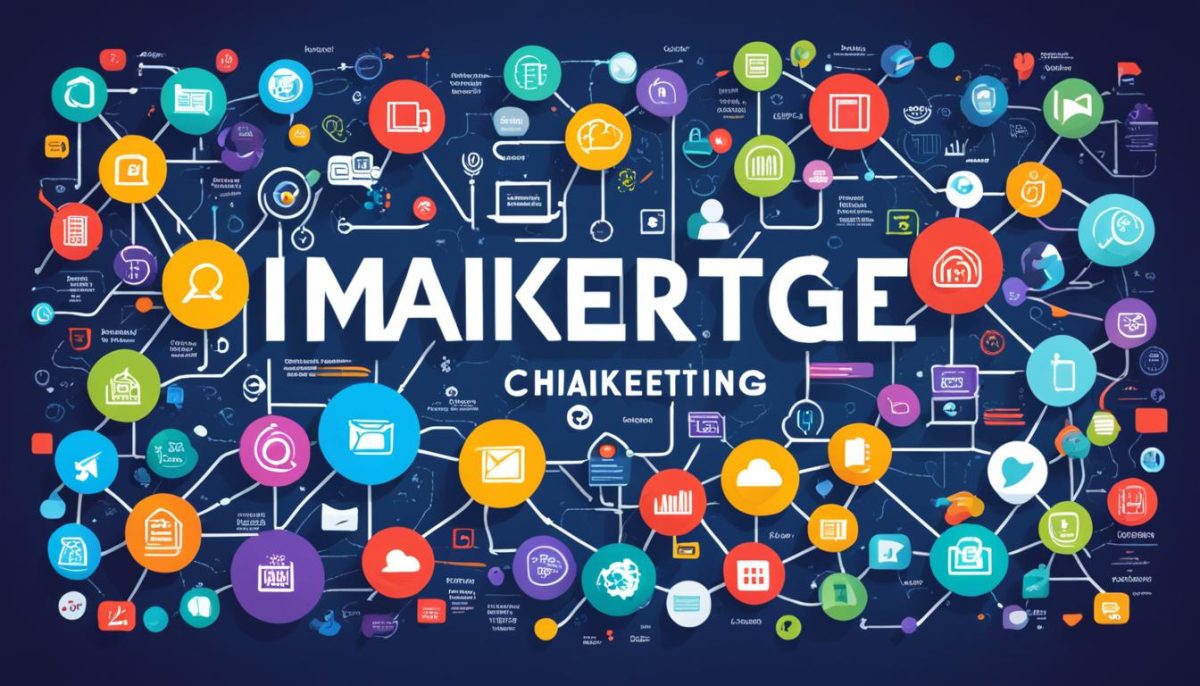Welcome to our article on the importance of digital marketing in today’s business landscape. As the digital era continues to expand its reach, it has become crucial for businesses to adapt and thrive in this online environment. Digital marketing has emerged as a powerful tool that can significantly impact a company’s success.
At its core, digital marketing encompasses various strategies and techniques aimed at promoting businesses, products, and services through digital channels. It involves leveraging online platforms to build brand awareness, engage with customers, and drive conversions. In this section, we will delve into the significance of digital marketing and explore why it should be a top priority for businesses.
The Power of Online Branding
In today’s digital landscape, online branding has become a powerful tool for businesses to establish their presence, enhance brand visibility, and engage with their target audience. With the rise of digital marketing strategies, businesses have the opportunity to create a cohesive brand image that resonates with customers across various online platforms.
One of the key advantages of online branding is its ability to increase brand visibility. Through carefully crafted digital marketing campaigns, businesses can ensure that their brand is consistently seen by a wider audience. Whether it’s through social media channels, search engine optimization, or targeted advertising, online branding helps businesses stay top of mind and increase their chances of being discovered by potential customers.
Furthermore, online branding plays a crucial role in customer engagement. By leveraging digital marketing strategies, businesses can establish meaningful connections with their target audience, fostering loyalty and trust. Engaging online content, interactive campaigns, and personalized experiences enable businesses to create a memorable brand experience that resonates with customers.
To maximize the power of online branding, it’s essential for businesses to maintain a consistent brand image across different online platforms. This includes utilizing consistent branding elements such as logos, colors, and messaging. A cohesive brand image not only enhances brand recognition but also helps customers develop a sense of familiarity and trust with the brand.
By harnessing the power of online branding, businesses can strengthen their position in the digital landscape, create a distinct identity, and build lasting relationships with their customers. Digital marketing strategies that focus on online branding, brand visibility, and customer engagement can propel businesses towards long-term success.
Reaching Target Audiences Effectively
When it comes to digital marketing, one of the key objectives is to reach the target audiences effectively. By understanding the unique needs and preferences of our target audiences, we can tailor our digital advertising and social media marketing strategies to connect with them on a deeper level.
One of the most powerful tools for reaching target audiences is digital advertising. Through platforms like Google Ads, businesses can utilize targeted advertisements to reach specific demographics, interests, and locations. By focusing our advertising efforts on the right audience segments, we can maximize the impact of our campaigns and generate higher conversion rates.
Social media marketing also plays a significant role in reaching target audiences. With platforms like Facebook, Instagram, and LinkedIn, we can engage with our audience on a more personal level and build meaningful connections. By creating compelling content and utilizing social media advertising features, we can ensure that our brand message resonates with our target audience and increases brand awareness.
“In the digital age, businesses have the power to connect with their target audiences in ways that were once unimaginable. By leveraging digital advertising and social media marketing, we can effectively reach our desired consumer base and build lasting relationships.”
Personalization is a key aspect of reaching target audiences effectively. By tailoring our marketing messages based on the unique characteristics and preferences of our audience segments, we can create a sense of relevance and resonance. Through personalized email marketing campaigns, for example, we can deliver content that speaks directly to the needs of our target audience and encourages them to take action.
In conclusion, reaching target audiences effectively is crucial for the success of any digital marketing campaign. By utilizing digital advertising techniques, social media marketing strategies, and personalized approaches, we can connect with our target audience on a deeper level and drive meaningful engagement. Understanding our audience’s needs and preferences allows us to deliver relevant and impactful messages that result in higher conversion rates and ultimately, business growth.
Driving Sales and Conversions
When it comes to achieving tangible results for your business, digital marketing channels play a crucial role in driving sales and conversions. We understand that generating revenue and acquiring customers are top priorities for any business, and a well-crafted digital marketing strategy can help you achieve just that.
One of the most effective digital marketing channels for driving sales is search engine optimization (SEO). By optimizing your website’s content and structure, you can improve its visibility in search engine results, attracting organic traffic and potential customers who are actively looking for products or services like yours. Investing in SEO can provide long-term benefits, as your website gains authority and credibility in the eyes of both search engines and your target audience.
Another powerful channel for driving sales and conversions is pay-per-click (PPC) advertising. With PPC, you can create targeted advertisements that are displayed to your ideal customers based on specific demographics and search queries. By bidding on relevant keywords, you can ensure that your ads appear prominently on search engine results pages, increasing your chances of capturing qualified leads who are ready to make a purchase.
Email marketing is yet another effective channel for driving sales and conversions. By building a strong email list and crafting compelling email campaigns, you can nurture your leads, engage your audience, and drive repeat purchases. Personalized and segmented email campaigns can help you create a sense of exclusivity and offer tailored promotions to your customers, increasing the chances of conversion.
As you develop your digital marketing strategy, it’s crucial to remember that each channel serves a purpose, and a holistic approach is key for maximizing sales and conversions. By integrating SEO, PPC advertising, and email marketing into your overall marketing mix, you can create a multi-channel strategy that optimizes each touchpoint in your customer’s journey, from initial discovery to final purchase.
Remember, driving sales and conversions requires a deep understanding of your target audience, their pain points, and their motivations. By crafting a message that resonates with your audience and delivering it through the most effective digital marketing channels, you can create a seamless customer experience that leads to increased sales and conversions.

In our next section, we’ll explore how analytics and data-driven decision making can further enhance your digital marketing strategies, allowing you to measure success, optimize campaigns, and continually improve your results.
Analytics and Data-Driven Decision Making
When it comes to digital marketing strategies, analytics and data-driven decision making play a crucial role in achieving success. By leveraging the power of data, businesses can gain valuable insights into their digital marketing campaigns, measure key performance indicators (KPIs), and optimize their strategies for better results.
Analytics provides businesses with the necessary tools and techniques to track and analyze various aspects of their digital marketing efforts. By examining data related to website traffic, customer behavior, and campaign performance, businesses can identify patterns, trends, and areas for improvement.
The Power of Data
Data-driven decision making enables businesses to make informed choices based on quantifiable evidence rather than relying on guesswork or assumptions. By collecting and analyzing data, businesses can understand their target audience better, gain insights into their preferences and behaviors, and tailor their marketing strategies accordingly.
“Data-driven decision making enables businesses to make informed choices based on quantifiable evidence rather than relying on guesswork or assumptions.”
With the help of analytics tools and platforms, businesses can track the performance of their digital marketing campaigns in real-time. They can measure important metrics such as website traffic, conversion rates, click-through rates, and engagement levels to determine the effectiveness of their strategies.
Optimizing Strategies Based on Insights
By analyzing the data collected, businesses can identify the strengths and weaknesses of their digital marketing strategies and make data-driven decisions to optimize their efforts. For example, if a particular campaign is not generating the desired results, businesses can use data to pinpoint the issues and make adjustments to improve performance.
Data can also help businesses identify their target audience segments more accurately, allowing them to create personalized and targeted marketing campaigns. By delivering relevant and tailored messages to specific audience groups, businesses can increase engagement, conversions, and customer loyalty.
The Importance of Analytics Tools
To effectively leverage analytics and data-driven decision making, businesses need to invest in robust analytics tools and platforms. These tools provide the capabilities to collect, analyze, and visualize data, enabling businesses to gain actionable insights and make informed marketing decisions.
Popular analytics tools such as Google Analytics, Adobe Analytics, and HubSpot Analytics offer a range of features and functionalities to help businesses measure and analyze their digital marketing efforts. These tools provide detailed reports, dashboards, and visualizations that can assist businesses in understanding their audience, tracking campaign performance, and optimizing their strategies.
Overall, analytics and data-driven decision making are essential components of successful digital marketing strategies. By harnessing the power of data, businesses can make informed decisions, optimize their campaigns, and achieve better results in the ever-evolving digital landscape.
Staying Ahead in the Digital Landscape
As businesses navigate the ever-changing digital landscape, it is crucial to stay ahead of the competition. In today’s fast-paced world, keeping up with the latest digital marketing trends and strategies is essential for success.
By staying up to date with the latest industry developments, businesses can leverage emerging technologies to their advantage. Whether it’s adopting new social media platforms, exploring innovative advertising channels, or investing in data analytics tools, embracing change is key to maintaining a competitive edge.
Furthermore, understanding and adapting to changing consumer behaviors is vital. By closely monitoring digital trends and consumer preferences, businesses can tailor their marketing strategies to meet their target audience’s evolving needs. This customer-centric approach allows businesses to deliver personalized experiences, build strong relationships, and drive customer loyalty.
Success in the digital landscape requires continuous learning and innovation. As technology advances and new opportunities arise, it is essential to invest in training and development to stay ahead. By staying nimble and embracing a growth mindset, businesses can not only keep pace with the competition but also lead the way in their industry.

